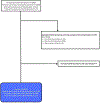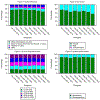Impact of the COVID-19 Pandemic on Cancer Clinical Trials: Alliance for Clinical Trials in Oncology Experience (Alliance A152022)
- PMID: 39296880
- PMCID: PMC11410363
Impact of the COVID-19 Pandemic on Cancer Clinical Trials: Alliance for Clinical Trials in Oncology Experience (Alliance A152022)
Abstract
Objective: The COVID-19 pandemic led to immediate changes in cancer clinical trial conduct. The primary aims of this study were to summarize the impact of the pandemic on Alliance for Clinical Trials in Oncology (Alliance) enrollment, protocol deviations, COVID-19 events (positive or presumptive-positive COVID test), and premature study discontinuation rates.
Methods: Enrollment trends were examined from January 2019 (pre COVID-19 pandemic) through 2022. Data were captured for protocol deviations and premature treatment and study discontinuation events across all Alliance protocols using a centralized Medidata Rave database, and summarized from January 1, 2020, through June 30, 2022. Descriptive statistics and graphical techniques are used to summarize observed trends.
Results: Overall enrollment across Alliance trials decreased during the COVID-19 pandemic and remained below pre-pandemic levels in 2022. Racial and ethnic demographics of enrolled patients did not change substantially. 4805 protocol deviations were reported on 2745 unique patients, with at least one protocol deviation reported by 618 sites and 77 unique trials. Commonly reported deviations were telemedicine visits (n=2167, 45%) and late/missed study procedures (n=2150, 45%). A total of 826 COVID-19 events were reported in 659 unique patients. Of an estimated 18,000 enrolled patients, only 68 withdrew from treatment and 45 withdrew from study due to COVID-19.
Conclusion: A centralized COVID-19 database enabled a comprehensive assessment of the impact of the pandemic across Alliance trials. COVID-19 led to an immediate decline in enrollment across all patient populations. While the number of trials open to patient accrual remained stable, several large, adjuvant studies completed accrual during this period, which contributed to accrual decline. Telemedicine usage was notable, and both COVID-19 events and study discontinuation due to COVID-19 were rare.
Keywords: Accrual trends; COVID-19; Clinical trials; National Clinical Trials Network (NCTN); National Community Oncology Research Program (NCORP); Pandemic; Protocol deviations; Telemedicine.
Figures


 2019 (N=5760 Participants);
2019 (N=5760 Participants);  2020 (N=5327 Participants);
2020 (N=5327 Participants);  2021 (N=4951 Participants);
2021 (N=4951 Participants);  2022 (N=3073 Participants)
2022 (N=3073 Participants)

Similar articles
-
Creating and Implementing a Principal Investigator Tool Kit for Enhancing Accrual to Late Phase Clinical Trials: Development and Usability Study.JMIR Cancer. 2022 Aug 25;8(3):e38514. doi: 10.2196/38514. JMIR Cancer. 2022. PMID: 36006678 Free PMC article.
-
Successes and lessons learned in database development for national multi-site cancer care delivery research trials: the Alliance for Clinical Trials in Oncology experience.Trials. 2022 Aug 9;23(1):645. doi: 10.1186/s13063-022-06536-x. Trials. 2022. PMID: 35945621 Free PMC article. Review.
-
Virtualized clinical studies to assess the natural history and impact of gut microbiome modulation in non-hospitalized patients with mild to moderate COVID-19 a randomized, open-label, prospective study with a parallel group study evaluating the physiologic effects of KB109 on gut microbiota structure and function: a structured summary of a study protocol for a randomized controlled study.Trials. 2021 Apr 2;22(1):245. doi: 10.1186/s13063-021-05157-0. Trials. 2021. PMID: 33810796 Free PMC article.
-
Promoting Accrual of Older Patients with Cancer to Clinical Trials: An Alliance for Clinical Trials in Oncology Member Survey (A171602).Oncologist. 2018 Sep;23(9):1016-1023. doi: 10.1634/theoncologist.2018-0033. Epub 2018 Apr 19. Oncologist. 2018. PMID: 29674441 Free PMC article.
-
The Impact of COVID-19 on National Clinical Trials Network Breast Cancer Trials.Curr Breast Cancer Rep. 2021;13(3):103-109. doi: 10.1007/s12609-021-00417-z. Epub 2021 May 12. Curr Breast Cancer Rep. 2021. PMID: 33995839 Free PMC article. Review.
References
-
- World Health Organization. Report of the WHO-China joint mission on coronavirus disease 2019 (COVID-19). 2020;1–40.
-
- Schrag D, Hershman DL, Basch E. Oncology practice during the COVID-19 pandemic. JAMA 2020;323(20):2005–2006. - PubMed
-
- Waterhouse DM, Harvey RD, Hurley P, Levit LA, Kim ES, Klepin HD, et al. Early impact of COVID-19 on the conduct of oncology clinical trials and long-term opportunities for transformation: findings from an American Society of Clinical Oncology Survey. JCO Oncol Pract 2020;16(7):417–421. - PubMed
Grants and funding
LinkOut - more resources
Full Text Sources
